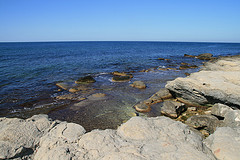Across the Kazakh Steppe to the Caspian Sea
Since leaving Turkistan, we’ve travelled 2500km in two separate train journeys to the far west of Kazakhstan, so far that according to guide book speak we’re almost in Europe (as though once you cross the Ural Mountains it’s all cobble-stone streets and gnocci alla gorgonzola thereafter) – in fact ‘almost in Russia’ would be a far more accurate description both geographically and culturally. Along the way we’ve discovered some of the various nuances of Kazakh train travel, which to begin with is quite luxurious, even in third class, to someone born and bred (figuratively) on Indian second class sleeper trains. On the latter, which is actually fourth class, you get nothing beyond a kitchen counter-style berth with some padding. But in Kazakhstan we get so much bedding in a special ‘kit’ – an extra mattress, two sheets, a blanket, a pillowcase and a towel – that we don’t know quite what to do with it all, and have been sort of reprimanded by train guards a couple of times for not making our beds correctly!
If the 46 hours we’ve spent looking out train windows in the past week is any indication, Kazakhstan’s western landscape is about as disinteresting as I’ve ever seen. For miles and miles on end, we travelled through flat semi-desert scenery dominated by endless straw-coloured shrubbery. The occasional small settlement, or camel, broke up the monotony, but the snow-capped peaks of southeast Kazakhstan are long gone, replaced mostly by vast swathes of nothingness – only three places on the 32-hour ride from Aralsk to Aktau are worthy of inclusion on a map. It’s easy to see now how Kazakhstan is one of the world’s emptiest countries; despite being geographically larger than India and its billion souls, Kazakhstan has only 15 million inhabitants, fewer than just the city of Mumbai alone and about the same as Calcutta. (And yet, Kazakhstan is still more densely populated than Australia!)
Between our two long train rides, we stopped at Aralsk, which would be a completely uninteresting town on the Aral Sea … if only the Aral Sea was still there. Instead, Aralsk is a mostly uninteresting town with a quirk: a waterless harbour, thanks to the Soviet diversion of the Aral’s river lifelines in the 1960s that caused the sea to drastically recede, one of the worst environmental disasters of all time. The sea then broke up into two parts; the larger Aral (mostly on the Uzbek side) seems lost for good, but the Kazakhs have dammed the smaller Aral on their side to try to save it – a process that seems to be working as the sea is inching back to Aralsk and is now only 60km away. But for now, a couple of rusting ships sitting on the semi-desert shrubs that make up the dried-up sea-bed, and a mural at the train station showing Aralsk fish feeding starving Russia in 1921 are all that’s left to remind anyone that the sea was ever there in the first place.
 After spending two more days in Aralsk than we wanted to while waiting for our train, and then two consecutive nights on the train (the longest train ride either of us have ever taken), we’ve finally arrived at Aktau on the eastern shore of the Caspian Sea. I’ve always been somewhat intrigued by the Caspian Sea, because it has an enchanting name, and because everyone’s heard of it but few really know where it is (due west across the sea from Aktau, 300km away, is the breakaway Russian republic of Chechnya), but mostly because for many years after childhood I erroneously associated it with The Voyage of the Dawntreader, which in fact features a Prince Caspian but no Caspian Sea.
After spending two more days in Aralsk than we wanted to while waiting for our train, and then two consecutive nights on the train (the longest train ride either of us have ever taken), we’ve finally arrived at Aktau on the eastern shore of the Caspian Sea. I’ve always been somewhat intrigued by the Caspian Sea, because it has an enchanting name, and because everyone’s heard of it but few really know where it is (due west across the sea from Aktau, 300km away, is the breakaway Russian republic of Chechnya), but mostly because for many years after childhood I erroneously associated it with The Voyage of the Dawntreader, which in fact features a Prince Caspian but no Caspian Sea.
I’ve been looking forward to visiting Aktau ever since we decided to go to Kazakhstan, partly because not many foreign travellers make it here; those who do are either coming from or going to Azerbaijan on the ferry that departs once a week or so, or are stupid enough, like us, to have come all the way here just to turn around and go back in the other direction again! There are some Muslim holy sites around Aktau that we want to visit, and then on Saturday we’ll cross into Uzbekistan, the last country on our Central Asian itinerary. And then after all this ‘Almaty is almost European’ and ‘once you cross the Ural mountains you’re in Europe’ talk … in only 13 days from now we really will be in Europe, and after spending all of the last 12 months travelling in Asia save eight days in Australia, Europe can’t come a moment too soon.
Tags: Aralsk, Asia, Central Asia, Kazakhstan, nothing, trains, Travel
